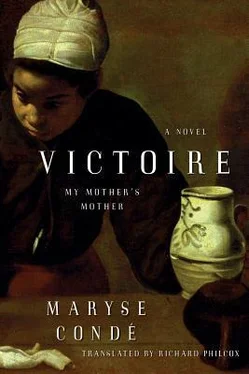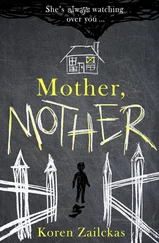An idea flashed across Caldonia’s mind like a poisoned arrow: the ponds, what about all those ponds on the flat island? She began to run from one to another, frightening the goats and the chameleons sleeping among the loose stones. Félix ran to warn his father, who was downing neat rum punches one after another at the Keep on Pouring rum store, to tell him that the little girl had disappeared. He stood up in a daze, his mind blurred by alcohol but conscious of the enormity of the misfortune, and joined the search party. As night fell, they lit chaltounés and the torches studded the dark like large glowing eyes.
Around eleven in the evening some of them gave up, thinking to themselves that Victoire had gone back home to hell. They found her in the graveyard at La Ramée, two miles from La Treille. La Ramée is a delightful graveyard by the sea where the dead rest wrapped in the blue linen shroud of the ocean. Each grave is marked with a border of conch shells. Victoire was asleep on her mother’s grave, under the cross that bore the clumsy lettering:
ELIETTE QUIDAL
PASSED AWAY IN HER FOURTEENTH YEAR
God, how our mothers die young!
Awakened without a word, Victoire slipped her hand into Caldonia’s and trotted off beside her. She never told anybody what had happened that evening. Caldonia plied her with questions: How did she manage to cover such a distance? Had someone guided her? If she had found the way all by herself, then she must have seen it in a dream. Victoire didn’t say a word and Caldonia worried herself sick. Was it a sign that her mother was calling for her and that her short time on earth was drawing to a close? Yet the year ended and others followed. Without incident.
When Victoire was ten she passed her catechism exam after two attempts. She could therefore take her first communion. First communion has the formality of a wedding and the gravity of a rite of passage. It takes place one Sunday morning at the time of high mass. A procession of children dressed in identical white albs, in order to eliminate any discrimination, with fingers joined together on mother-of-pearl rosaries and the girls wearing crowns of artificial flowers in their hair, enter the church singing. They walk up to the altar in unison. Then the families go to enormous trouble to make sure there is the chodo cake at the reception.
A few months later Gaëtane Jovial asked Caldonia if Victoire could come and help her servant Danila. Caldonia hesitated before giving her approval. Not because there was no offer of wages. This was usual for this type of restavek job. The truth was that ever since the unexplained incident at the graveyard, she didn’t like to be separated from her granddaughter. Victoire followed her everywhere, silently losing herself in the shadow of her ample silhouette. She finally accepted because she thought the child would gain experience and an education. Gaëtane, in fact, was simply and reluctantly obeying Thérèse, who urged her to do so in all her letters. Like Danila, she attached little importance to Victoire. Like the people at La Treille, both of them must have been scared of her. Danila managed the amazing feat of never saying a word to her during all those years of cohabitation, except for giving her orders:
“Fô ou fè…”
“Pa obliyé…”
“Atansyon!”
In fact, Victoire was treated like a pariah, like a slave at the Jovials. Never like a relative, not even a poor or disreputable one.
Sweep, dust, scrub the floor, beat the rugs, wax the furniture, shine the silverware, wash the sheets, boil and starch them with the shirts and the petticoats, as well as help in the kitchen — such was her lot. Every morning she started work at six and ended her day at seven, even eight. She would walk back to La Treille in the dark and, exhausted, slip into Caldonia’s bed (Caldonia had now been totally abandoned by Oraison). Curled up against her grandmother, she pretended not to hear the roar of the wind over the sea, the gallop of the three-legged horse, the Bête à Man Ibè , around the cabin and the wails of all those soukouyans scouring the countryside, thirsting for the blood of humans. To reassure her, her grandmother would tell her stories or hum songs. The little girl especially liked a cane-cutter’s song:
Zip, zap, wabap
Ma bel, ô, ma bel
LET’S FOLLOW HER little silhouette, rigged out in her unprepossessing clothes, tripping over her bare feet. She wore her first pair of shoes when she was almost sixteen, a present Thérèse brought back from Havana.
The road from La Treille runs down from a rocky hill, then, on reaching level ground, joins the one from Grand Bourg at a crossroads marked by mango trees and a twisted calabash tree. It then veers to the left and enters the town center. If you continue straight on you come to the town hall, the masterwork of Sylvain Tarpinius, a student of Ali Tur, and the smell of iodine grips you by the throat. Victoire emerged onto the seafront with its fully rigged sailboats lined up along the wharf. Perhaps influenced by Oraison’s fantastic tales, she distrusted this blue expanse. Moreover, she would cross it with great caution only three times throughout her entire life. Nobody knows what lies beneath the ocean, now calm, now churned with waves. However, she liked the sea breeze and its refreshing smell of benzoin. She sat huddled at the end of the jetty, her head turned toward Dominica, sitting dog-shaped on the blue of the horizon.
Then she retraced her footsteps as far as the Jovials’ house. Soon, she would be down on both knees washing and scrubbing the brick red flagstones on the sidewalk. When she came in, Danila, who was sipping her coffee as sweet as honey, didn’t even trouble to greet her with a “Bonjou! Ou bien dònmi?” Taking some money from her blouse, she groused:
“Sé lanbi yo vlé manjé jodi-là, oui!”
Victoire obeyed and flew off.
Her trip to the market was her daily escape, her little moment of liberty in the tyranny of her hardworking days. Nobody on her back. She was particularly fond of lingering in front of the meat booths and never tired of watching the butchers in their leather aprons slicing the carcasses with their meat cleavers— wham! — handling the scale pans with their bloodied hands and throwing, kind fellows, liver scraps to the dogs who stuck their tongues out at passersby. It was a pleasure to rediscover in Eloges Saint-John Perse’s same fascination for these brutal scenes:
“… and Negroes, porters of skinned animals, kneel at the tile counters of the Model Butcher Shops, discharging a burden of bones and groans,
And in the center of the market of bronze, high exasperated abode where fishes hang and that can be heard singing in its sheet of tin, a hairless man in yellow cotton cloth gives a shout: I am God! And other voices: he is mad!”*
In the kitchen, Danila assigned Victoire only the thankless jobs, such as beating the conch meat, extracting the crabmeat, scaling the fish with a pointed knife, plucking the fowl, skimming the soup, cutting and chopping chives and shallots, pressing the lemons, and, at a pinch, cooking the Creole rice. But by dint of spying on Danila, like a slave who, scared of being punished, learns to read in hiding, Victoire learned her first lessons, perfecting herself in secret.

Caldonia received no warning of her death in one of those dreams she professed to know the key to.
The day she passed away was marked by none of those signs, none of those omens people recall emotionally much later. Nobody could say:
Читать дальше













